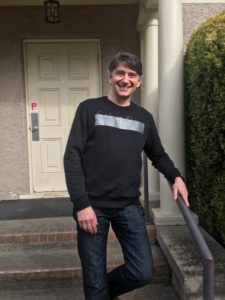Know Your Profs is an ongoing series of profiles on the instructors at Camosun College. Every issue we ask a different instructor at Camosun the same 10 questions in an attempt to get to know them a little better.
This issue we talked to Camosun Hospitality Management instructor David Armstrong about teaching multiple generations, his sense of humour, and staying in touch with former students.
1. What do you teach and how long have you been at Camosun?
I’m a faculty member in the School of Business, Hospitality and Tourism Management program. I’ve taught a lot of courses over the years but have primarily focused on the applied elements of our program: for example, the Dunlop House Restaurant classes and our Integrated Events Management course. In addition, I am the co-operative education and internship coordinator for our program’s mandatory paid work terms. In this role I act as a resource and a liaison between the program and the Co-operative Education department, as well as between students, faculty, and employers. I’ve been at Camosun longer than many students have been alive—I started in 1988; you can do the math—and have actually taught my former students’ kids. That was a shock.

2. What do you personally get out of teaching?
I’ve been very blessed to stay in touch with so many of my former students and to watch them grow and develop into amazing industry and community leaders. I think that the reward is in them wanting to continue these relationships with myself and the program after they have graduated. I can’t count the number of times that graduates have called asking if we have any students who might want co-op jobs, if they can come into the class to present a guest lecture while they are in town, if they can mentor a current student, or if I just want to get together and catch up over a bite to eat or a beverage.
3. What’s one thing you wish your students knew about you?
I hope that they know that I am genuinely invested in their success, and that I want them to be successful. That I’ve made mistakes too, and that that is normal and okay.
4. What’s one thing you wish they didn’t know about you?
I have a pretty twisted sense of humour at times. I grew up in a very English family who held the belief that if you weren’t able to laugh at some of the things that life throws our way, that life can drag you down.
5. What’s the best thing that’s happened to you as a teacher here?
As noted above, I’ve made some wonderful friendships and have been lucky enough to work with some amazing people. If it weren’t for them, and their genuine drive and sense of commitment to our students, I wouldn’t still be here.
6. What’s the worst thing that’s happened to you as a teacher here?
Cutbacks and budget challenges that directly affected both our internal and external stakeholder groups.
7. What do you see in the future of post-secondary education?
I’m a very strong believer in applied experiential learning. As such, I believe that classrooms of tomorrow will not only provide more cross-disciplinary and flexible programming, but that this will happen in ever more globalized settings that provide a broader range of campuses and experiences to future students. To do this, we will need to develop greater levels of cross-cultural awareness and competencies, not to mention a willingness to learn another language. I also think that we will continue to see industries, governments, colleges, and universities joining forces in order to address skills shortages in what is becoming a war for key talent on a global scale. While I don’t think technology will ever fully replace face-to-face learning, I do believe that it has a significant role to play in how education will be delivered, both at school and in the workplace.
8. What do you do to relax on the weekends?
At the moment, I don’t! I have two very active children, both of whom are involved in rep-level sports. I’m also a student too, so my weekends are often split transporting little people, watching a game, trying to figure out the meaning of an endless stream of journal articles, or writing papers.
9. What is your favourite meal?
Tough question… It depends on what the situation is, where I am, and who I’m with. In my field, I eat pretty well, and I’ve had the opportunity to eat great foods all over the world.
10. What’s your biggest pet peeve?
A lack of accountability. [As British academic Reg Revans said,] “There is no learning without action and no action without learning.”
